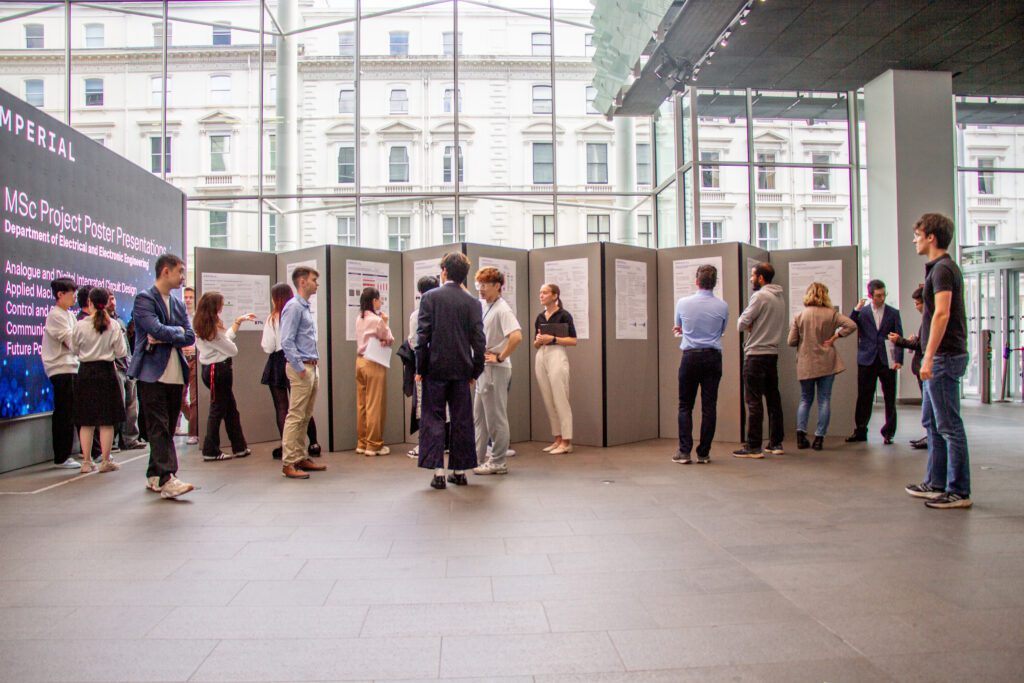Imperial College London ranks first in the UK and Europe and second in the world, according to QS World University Rankings 2025.
Here, they say: “Our work impacts the world, and our community reflects it.” Last year, the university welcomed more than 140 nationalities to campus.
The Department of Electrical and Electronic Engineering (EEE) is at the heart of this forward-facing community, based in London’s historic museum quarter. EEE is a world-class centre of research and education known for pioneering work in electrical energy systems, electronics, communications, information engineering and control.
The department’s world-leading research directly shapes its six specialist postgraduate taught Master’s (MSc) courses, designed for ambitious engineers ready to make an immediate impact in high-demand fields.

For Salvador, studying at Imperial is more than academic achievement -– it’s the next step in a journey to apply engineering where it’s needed most. Source: Imperial College London
Salvador came to Imperial with a clear goal: to harness artificial intelligence and mechatronics to improve lives –– particularly in the healthcare, mobility, and energy sectors. “My aim is to become a leading scientist in Mexico, fostering technological advancement in AI and helping to support and uplift vulnerable communities,” he says.
With a background in Mechatronics Engineering from UNAM –– ranked among the top universities in Latin America –– Salvador brought both strong academic foundations and international industry experience, having worked in Mexico, the US, and Germany for companies like Volkswagen and BMW.
He chose EEE’s MSc in Applied Machine Learning for its hands-on, interdisciplinary approach. “This is the best programme for building on my background in mechatronics and implementing novel AI algorithms into hardware through hands-on laboratory work,” he says. “It also offers a long list of elective modules we can select depending on the subfield we want to specialise in.”
For his research project, Salvador is working on a contactless arterial blood pressure monitoring device using Signal Processing and Deep Learning to extract patterns from radar signals.
Now funded by a Chevening Scholarship –– awarded by the UK Foreign, Commonwealth and Development Office –– he is focused on making the most of the opportunity. “Imperial provides top-class education, incredible networking and personal growth.”

Imperial’s top-10 global ranking and its exceptional engineering departments were key reasons Nandini chose EEE. Source: Imperial College London
Nandini chose Imperial for its global ranking, the strength of its engineering departments, and the energy of central London. “Driven by a ‘give-it-your-all’ philosophy, I selected Imperial to immerse myself in a truly world-class, career-focused environment,” she says.
Currently studying for her MSc in Communications and Signal Processing, she brings a background in Electronics and Telecommunication Engineering and industry experience from Vodafone Idea Limited in India. “This hands-on work complements my academic pursuits and gives me a well-rounded perspective on both theoretical and applied aspects of modern communications systems.”
Outside the classroom, Nandini has embraced London life. “Accustomed to a lively home city in India, I’ve embraced London’s multicultural tapestry,” she says. A passionate fiction reader, she also highlights meeting a favourite author and receiving a signed copy as a personal London highlight.
Looking ahead, she hopes to apply her knowledge to real-world communications challenges before pursuing a PhD. “Eventually, I’d love to go into teaching and research, inspiring the next generation of engineers as I’ve been inspired,” she shares.

Future focused: building new pathways in response to industry needs –– a brand new course in Sensor Systems Engineering. Source: Imperial College London
EEE’s Master’s programmes develop to meet the needs of students and the industries they aspire to join, delivering relevant, real-world expertise. From long-established programmes like Nandini’s, to more recent ones such as the MSc in Future Power Networks, delivering the global transition from fossil fuels to smarter, greener electricity.
EEE’s latest programme is the new MSc in Sensor Systems Engineering, launching in 2025. It’s designed to give graduates the tools to engage with the systems at the heart of tomorrow’s technologies, and respond to challenges in healthcare, digital economy, manufacturing, energy, and AI –– equipped with solid foundational knowledge and hands-on technical experience.
Course director Dr. Oleksiy Sydoruk explains, “Sensors are everywhere –– from consumer electronics to industrial machinery and spacecraft –– they are a backbone of modern technology.”
“Most existing courses focus only on one part of the picture. Sensor systems are traditionally taught as disjointed subjects. A graduate might know sensor physics, but not instrumentation, signal processing, or how sensors are used in AI and big data. Our MSc aims to change that.”
Students on the programme will learn to understand and optimise the entire sensor system development pipeline –– from physical principles and instrumentation to programming, networking, and applications in artificial intelligence and machine learning. They’ll also gain hands-on experience in labs and a micro- and nano-fabrication cleanroom, where they design, make, and measure their own sensors.
“The growing demand for the amount, breadth, and immediate availability of data from sensors means systems need to be optimised at every step,” says Dr. Sydoruk.
“We need people who can make design decisions in view of the total system performance. Experts in sensor system engineering are in demand across so many industries. This course prepares students to step confidently into those roles.”
Imperial is committed to bringing the brightest minds from across the world together to tackle global challenges, and scholarships play a pivotal role in this. Five scholarships are available to EU residents for EEE MSc programmes, covering the difference between UK and overseas fees, supporting outstanding students to come to London, to develop as individuals, researchers and future leaders.
Start your engineering journey in the heart of London.
Follow the Department of Electrical and Electronic Engineering on Facebook, X, LinkedIn, and Instagram

